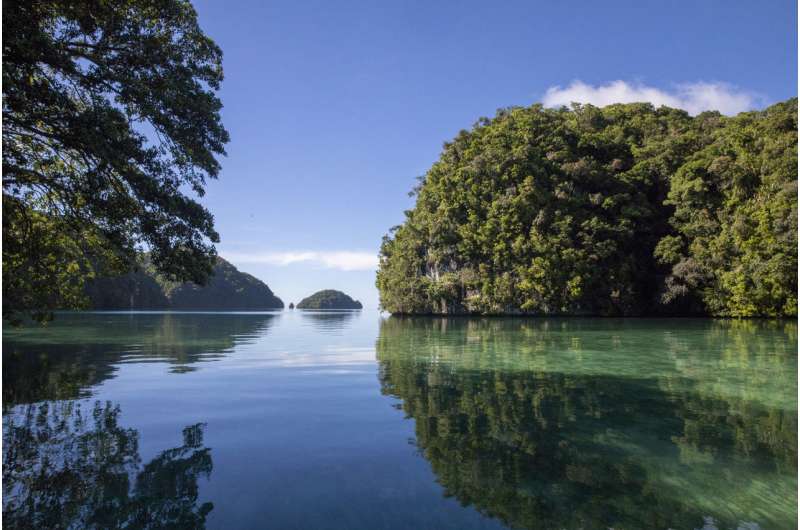Researchers discuss climate change and small-scale fisheries in the pacific

Nations and territories on small islands in the Pacific Ocean are likely to be some of the most drastically affected by global climate change. That's because these communities depend heavily on nearshore, small-scale catches of fish, crustaceans and other marine populations that are likely to be disrupted by changing ocean temperatures and loss of coral reefs. These fisheries are also pillars of cultural and economic independence in impoverished and marginalized areas.
Pacific island countries and territories are under pressure to craft and execute flexible policies that will help them respond to this uncertain future. Larry Crowder is a professor of biology and one of the researchers helping to guide those policies. He recently curated papers in a special issue of the journal Marine Policy focused on the sustainability and management of small-scale fisheries in these regions. Elena Finkbeiner, a social scientist and research fellow at the Center for Ocean Solutions, is an author of one of the papers in the issue.
Finkbeiner and Crowder, who is also the Edward Ricketts Provostial Professor, talked with Stanford News about what this special issue can tell us about the future of fishing and life on Pacific islands.
Why was this collection of papers needed?
Crowder: The purpose of this special issue was, almost for the first time, to specifically look at the possible climate change issues facing small fisheries and make them more resilient.
We've done most of our research in industrial fisheries. But if you look at the people around the globe who work in fisheries, over 90 percent of them work in small-scale fisheries. And if you look at what the small-scale fishermen produce in terms of fish, they produce half the fish that goes to direct consumption by humans.
They employ a lot of people, they provide critical food around the world, and they are highly vulnerable to climate change because a lot of those fisheries have limited technological capacity. If the climate changes, that could drive a shift in the distribution of their target species, and it's much more difficult for them to move than it would be for a big industrial boat that can go fish virtually anywhere.
What special challenges face small-scale fisheries in the Pacific islands?
Crowder: There's more on the line for small-scale fisheries because people's livelihoods and incomes and lifestyles are closely linked to the resources, and they can't just sell out and go open a bowling alley.
We're raising an issue that doesn't seem to have gotten a lot of attention but will be particularly important, largely because of the limitations of these human populations to pick up and move as the populations of fish that they rely on pick up and move. If people are fishing along a 20-kilometer stretch of beach, what they're going to have access to over the next 50 years is going to change pretty dramatically.
In the Pacific islands they're really aware of the words "climate change" because a lot of the fisheries are coral reef dependent. They've seen coral bleaching events; in the low-lying islands there are people considering the exit strategy for their whole country as sea level rises. They're looking for land in New Zealand to evacuate their country to.
Finkbeiner: Climate change is tricky because it creates these interacting stressors on coastal communities. You'll have sea level rise at the same time that you have migration of fish out of the tropics and toward the poles. You might also have more variable storms with increasing intensity and frequency. These stressors accumulate as a result of climate change, but a lot of the time policies that are meant to address these stressors only address one at a time. And because climate change is also interacting with other processes like poverty, coastal development and food insecurity, with narrowly focused policies you run the risk of alienating the most vulnerable communities.
What conclusions do you hope that people draw from these papers?
Crowder: For managers, it's raising their awareness that this is happening. Some of the traditional management techniques we have used for static fish populations may not be effective when the populations are more dynamic. A lot of the changes we've made over the last 50 years may have been reducing flexibility for fishermen: Management has pushed fisheries to specialize more, which might not be a good strategy in the long term.
For public policy makers, I hope that we get them ready to be thinking about climate change and whether the policies they're putting together are flexible and adaptable enough to manage under climate change, and whether they need to reconsider some decisions they have made.
Finkbeiner: Coastal access is really important for Pacific island communities like Hawaii, for example, in terms of their cultural way of life, but also for food security and livelihood.
In Hawaii, if you choose to harden shorelines with seawalls to protect tourism infrastructure from sea level rise, at the same time you run the risk of undermining access of local native Hawaiians to the marine environment.
We have to encourage explicit attention to these types of trade-offs that can be generated by climate change response and policy, in order to empower and protect very vulnerable communities and people.
More information: www.sciencedirect.com/journal/ … olicy/vol/88/suppl/C
Journal information: Marine Policy
Provided by Stanford University



















